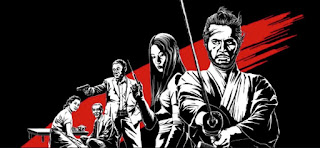A Fistful of Samurai
Japan 2020 Cinema season at the British Film Institute | BFI Player
The British Film Institute celebrates 100 years of Japanese cinema with a season of films that were influential and memorable. At the same time they are accessible, action packed and enjoyable. It’s one of the few cinematic movements that combined high art with mass entertainment. The French and Italian New Wave film-makers of the 1950s and 60s tended to have too high a regard for their own artistry, and appealed to only the most goatee-bearded of hipsters.
The first London Film Festival, in 1957, opened with Akira Kurosawa’s Throne of Blood, which was his magnificent version of Macbeth, set in feudal Japan. It featured Toshiro Mifune, as the battle weary Thane / General, and Isuzu Yamada playing probably the most convincing and terrifying Lady Macbeth ever seen on screen. Mifune became synonymous with the lone, existential hero and reprised similar roles throughout his long career.
The season includes a number of absolutely unmissable gems. Rashomon (1950), for example, tells the same story four times, from the perspectives of four different characters. This device has been influential and used in a number of films such as Pulp Fiction, Gone Girl, The Usual Suspects and The Hateful Eight.
Even The Simpson’s has a joke about it, with the family travelling on Air Japan: -
Marge: Come on Homer, Japan will be fun. You liked Rashomon.
Homer: That’s not how I remember it.
Meanwhile, The Hidden Fortress (1958) so inspired George Lucas that he copied it, frame by frame, to make Star Wars (1977).
Clint Eastwood loved Yojimbo (1961) so much that he stole it to make A Fistful of Dollars (1964). The man with no name transposed from medieval Japan to the American Wild West. The original is one of my favourites also, with the rival gangs in a small town being played off against each other to comic effect. The coffin maker is the most prosperous citizen, in a corrupt den of gamblers, thieves and gangsters. The man-with-no-name dispatches justice in elegant super-hero Samurai style.
Seven Samurai (1954) was re-made by Hollywood into The Dirty Dozen. The difference is that nobody watches The Dirty Dozen anymore, but festivals will forever be playing the Kurosawa original. Or at least if people do watch the remake, they tend to fall asleep, as it used to be played in the Sunday after lunch slot. We don’t watch films in that way anymore. An iPhone is all you need. Or a PlayStation console and a decent screen.
The Hidden Fortress by Akira Kurosawa. Fully plagiarised by George Lucas when making Star Wars.
Out damned spot. Lady Macbeth in Throne of Blood (1957).
But the supreme exhibit, and one that everyone must watch, is Tokyo Story (1953). Probably the finest film ever made and in most ‘greatest ever’ movie lists. It’s right up there with Citizen Kane, The Godfather, Vertigo and It’s a Wonderful Life.
Directed by Yasujiro Ozu, it is a simple tale of an elderly couple visiting their grown up children in the city. So caught up in their own lives and preoccupations are their offspring and grandchildren, that it’s only their bereaved daughter-in-law who shows them kindness, hospitality and respect. She lost her husband (missing in action and presumed dead) in the recent Second War war, and her in-laws tenderly encourage her to move on, and build her life with someone new. It’s heartbreaking.
Immerse yourself in this festival, online, and you’ll make new companions that will last you a lifetime.
The Japan 2020 season runs from May to November 2020, online at https://player.bfi.org.uk. It will also play at selected cinemas when they open.



Comments